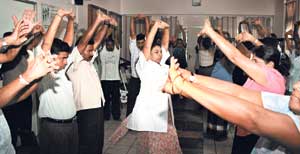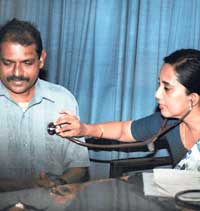
Beyond mending the heartIt is 9.30 on Saturday morning and the lecture theatre of the Cardiology Unit at the National Hospital has about 30 to 40 men and women, walking around briskly or exercising. A physiotherapist is taking them through the exercises while at the far end of the room doctors are in consultation. This is the Cardiac Rehabilitation Clinic of the National Hospital, and this cheerful group comprises patients who have recently had heart attacks or undergone 'bypass surgery' (Coronary Artery Bypass Grafting)."The Cardiac Rehabilitation Programme is aimed at secondary prevention, that is to prevent further disease progression in the patients who have already had heart attacks or related diseases," says Dr. Mrs. Sepalika Mendis, Consultant Cardiologist and founder of this programme in Sri Lanka. Heart attack is one stage of the category of diseases collectively named as ischemic heart disease (IHD). Ischemic heart disease occurs due to reduced blood supply to the heart because the blood vessels that supply the heart are narrowed by the deposition of cholesterol. Initially patients suffer chest pain with exertion. This progresses with time, if some intervention is not done. Gradually a patient's exercise capacity reduces and all of a sudden some have a heart attack. At this point the blood supply to the heart is almost completely cut off and the viability of heart muscles is threatened.
When there is severe occlusion (narrowing) of vessels, cardiac bypass surgery is done to improve the blood supply. Even then, meticulous management is necessary to prevent re - occlusion and other complications."These patients need management by a multi-disciplinary team," says Dr. Mendis, explaining that management of a patient with ischemic heart disease involves correction of lifestyle, promotion of exercise, healthy eating habits and reduction of stress, not only medication. Factors like a sedentary lifestyle, lack of exercise, unhealthy food and stressful life are all known to predispose people for ischemic heart disease. Therefore, if a patient is sent home only with a few drugs after being diagnosed as having ischemic heart disease, he is likely to come back with a worse problem. Hence, ideally every cardiac patient should be referred to a rehabilitation programme where they are educated and their lifestyles changed to promote health. This was a must for every cardiac patient in western developed countries, where this concept was introduced decades ago, and our Asian counterparts are years ahead of us. In Sri Lanka, the programme was launched five and half years ago by Dr. Sepalika Mendis, with the support of consultant cardiologist Dr. S. R. De Silva in the National Hospital. The rehabilitation programme team has to have a cardiologist, physiotherapist, nurse, dietician, pharmacist, psychologist and other minor staff attendants. Since this was a new concept it was started small and even doctors were not aware that they could refer the patients to the clinic. To find the staff, to volunteer to do an extra bit of work was difficult."We started with two patients, both having the same name, and the staff was more in number than the patients," reminisces Dr. Mendis, happy with the progress they have made. The programme has now rehabilitated almost 2000 patients. Currently the clinic is held twice a week on Wednesdays and Saturdays, at the Cardiology Unit. All patients who have had heart attacks and undergone coronary artery bypass surgery at the National Hospital, are referred to this clinic for rehabilitation. Each patient has to undergo a two-month programme with 8 sessions where they are educated as to what their illness is, and how they can modify their lifestyles and their diet. These health, education and counselling sessions are done on a one-to-one basis so that patients get individual attention. If they are distressed over their illness, psychological support is offered at the clinic itself. Family members too can participate in the clinic, so that they know what to cook and how to look after the patient.
When patients come in to the clinics, they are served a sandwich, a glass of non-fat milk and a fruit and advised on a healthy diet. Once in about six months, demonstrations on healthy food are held, funded by contributions of well wishers. Patients are supposed to exercise under the supervision of the clinic staff. As these are heart patients, equipment is on hand for any emergency, in the clinic itself. Physiotherapist Ms. Upul Athukorala guides patients about healthy exercise. "Ideally exercise should be done at least three days a week, but we do not have facilities to conduct this programme so often so they are supposed to exercise at home, " she said. From time to time the efficiency of the programme is evaluated. At the beginning, MediScene learns only 25 percent of the patients knew something about what a heart attack was, but, with individual patient-oriented health education sessions, patients are more knowledgeable about their illness, what medication they use etc. "One objective of the clinic is to enable patients to take responsibility for their illness," explains Dr. Mendis. Once a month, staff and the patients get together for a musical concert. Veteran musicians are invited and an indoor concert is held on a small scale with soothing slow music being played, for about two hours in the clinic itself for stress relief. Dr. Mendis and her team have trained personnel at Jaffna, Anuradhapura, Badulla, Gampaha, Ampara and Ratnapura hospitals, and currently there are clinics in Badulla, Ampara, Jaffna and Anuradhapura hospitals. Nurses and physiotherapists all over the country have also been trained. "This programme can be implemented in any government hospital, where there is a physician, and ideally it should be done with the rise in the number of heart patients," stressed Dr. Mendis.
The main drawback of the programme is not being able to serve everyone in need due to lack of space. "If a spacious place is available close to the National Hospital we could cater to more patients," Dr. Mendis concluded on a note of hope. |
|| Front
Page | News | Editorial | Columns | Sports | Plus | Financial
Times | International | Mirror | TV
Times | Funday
Times | Medi Scene || |
| |
Reproduction of articles permitted when used without any alterations to contents and the source. |
© Copyright
2007 | Wijeya
Newspapers Ltd.Colombo. Sri Lanka. All Rights Reserved. |

